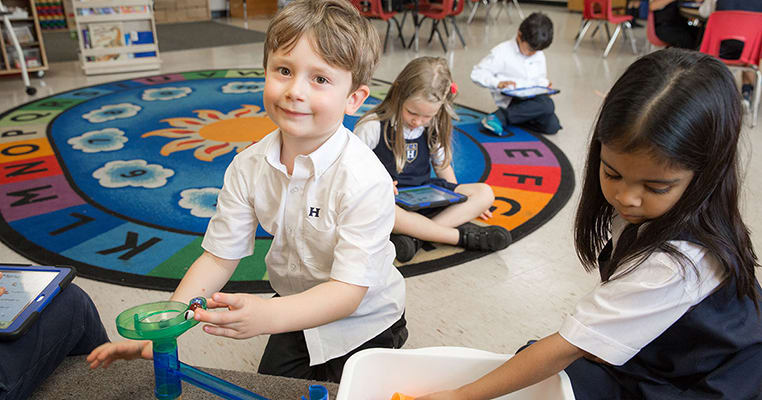The Kindergarten program at Hudson College perfectly embodies this ideal. Its Reggio Emilia-inspired educational approach provides fertile ground for learning, development, and growth. Educators trained in Reggio methods encourage kids to explore and investigate their surroundings, pursue their interests, and take on challenging tasks, on their own and in groups.
“Our teachers are compassionate and motivated to help children reach their full potential,” says Kindergarten Teacher Jennifer Brantley. “We think children are very capable—they’re natural learners and researchers. Some want more scientific research, while others are interested in more artistic endeavours. We look at children as the adults they’ll eventually be.”

Child-centred learning
In fact, the Kindergarten staff at Hudson College are facilitators as much as they are teachers. One of their most important roles is to help connect kids with meaningful activities and work. Using the Reggio Emilia model, they closely observe each child, gauge their interests, document their learning, and reflect on developmentally appropriate ways to expand their knowledge. This enables them to provide a dynamic and collaborative environment in which kids can thrive and grow, not just academically, but socially and emotionally.
Small class sizes are vital to Hudson’s child-centred approach to early learning, with just 13 students in Junior Kindergarten. They ensure every kindergartener receives the attention they need to build their confidence and special strengths. “Our small class sizes create a family-like environment,” says Brantley. “They build intimacy and autonomy. Kids feel more comfortable making their own choices, taking chances, and making mistakes. They’re highly motivated to explore all the different stations in the classroom and see what they have to offer.”
Kids are given plenty of latitude to pursue their interests and choose the activities they want to participate in. Hudson uses what’s called an “emergent” curriculum, one that’s constructed based on children’s interests (though the curriculum is “co-constructed” with the teachers). Some chief benefits of this curriculum are that it builds persistence, resilience, and confidence. What’s more, it provides students with the comfort and familiarity needed to take risks and respond appropriately to success and failure.
Academics
Rest assured, though, Hudson’s Kindergarten program doesn’t give short shrift to academics. “We teach math every day,” says Brantley. “We have lots of experiential materials for early math learners, and then move on to more abstract things like numbers and counting.”
Language is also a major focus. “There are lots of opportunities to explore language in the classroom, since it's immersed everywhere—on walls, cubbies, classroom materials, and much more.” There is a purposeful balance between directed learning in the core curricula of maths and language, and an emergent, inquiry-based program.
The Kindergarten schedule also includes French, music instruction with Orff instruments, drama, gym, and art. Throughout, teachers provide guidance, mentorship, and coaching to nurture children’s passions and inspire and cultivate a love of learning.
Overall environment
The overall environment is one of inventiveness, curiosity, and creativity. This makes for a fun and dynamic classroom. “When you go to Hudson,” says parent Nicolette Linton, “it may be quiet at times, but there’s always this hum of things going on.”
There’s also plenty of encouragement in Hudson’s JK and SK classrooms. “Teachers provide caring guidance and mentorship every step of the way,” says Brantley. “This makes for a wonderful and supportive community where kids grow as learners and leaders.”
While teachers give kids lots of room to pursue their passions, independently and collaboratively, they’re far from being just observers. Instead of just sitting back and watching, they often participate in activities and projects alongside the students to help co-construct the learning environment.
Inspired by the Reggio Emilia approach, Hudson’s Kindergarten program also encourages plenty of parental involvement. “Families are consulted when forming curricula and project plans throughout the year,” says Brantley. “We’re always communicating with families to build a rapport with them. Sometimes we learn about children’s interests from parents, based on what they like to do at home.” This collaborative component encourages a continuum of learning when the children get home, thereby helping parents understand what the children are doing by making the learning more visible and direct.
Parents are also welcome to participate in school and student life, including in events like spelling bees, concerts, plays, and field trips, as well as special classroom activities. This shouldn’t be overlooked, as research shows that parental involvement in education is a major contributor to student success and achievement, in both the early and later years.
“I love the smaller school environment,” says parent Nikki Seaton. “Because it is so community-minded, you really do know everyone.”










